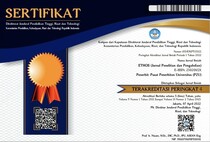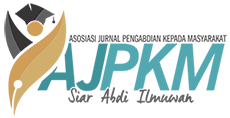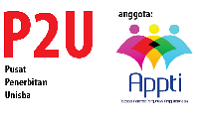PENGEMBANGAN INSTRUMEN DAN BAHAN AJAR KALKULUS INTEGRAL MELALUI STRATEGI SCIENTIFIC DEBATE
Abstract
The implementation of an integral concept in the real life was very broad, but the student’ remains for it in the low category. The strategy of Scientific Debate was allegedly capable to enhance the students’ ability in the integral concept. The most important part in the learning process of the Scientific Debate is learning materials and instruments as a means of evaluation. Learning materials and instruments are capable if can measure what should be measured and must have validity, reliability, have criterion power, and the difficulty index. The development of learning materials contains a dish concept, examples of routine and non-routine problem, to exercise routine and of nonroutine the question, to reserve application problem. The results of the trial of the instruments was obtained significance value 0.42 that is means the experts have weigh the validity of the content of grains of matter uniformly. The significance value of the question validity is 0.82 it means advance category from the language and images. The significance value of reliability is 0.87 that is included in the advance category. The analysis of the difficulty degree shows the problem number 7 categories difficult, problem number 1, 2, 4, and 6 categories quite, and the problem numbers 3 and 5 categories easily. Analysis of the classification of the criterion power show the problem numbers 1, 2, and 3 is good quite, the problem number 4, 6, and 7 are good, as well as the problem of the number 5 included is excellent.
Keywords
Full Text:
PDFReferences
Alibert, D., Legrand, M. & Richard, F., (1987) ‘Alteration of didactic contract in codidactic situation’, Proceeding of PME 11, Monteral, 379-386.
Dubisnky, E. (2001). Using a Theory of Learning in College Mathematics Courses. Coventry: University of Warwick.
Kilpatrick, J., Swafford, J., & Findell, B. (2001). Adding It up: Helping Children Learn Mathematics. Washingon, DC: National Academy Press.
Niss, G. (1996). Goals of mathematics teaching. In A.J. Bishop, K. Clementa, C. Keitel, J. Kilpatrick,& C. Laborde (Eds.). International handbook of mathematical education. Netherlands: Kluwer Academic Publisher.
Orton, A.(1983). Student’understanding of Integration. Educational Studies in Mathematics, 14, 1-18.
Ramdani, Y., (2011), Scientific Debate Instructional to Enhance Students Mathematical Communication, Reasoning, and Connection, Bandung: Indonesian Education University.
Ramdani, Y., (2013), Scientific Debate Instructional to Enhance Students Mathematical Communication, Reasoning, and Connection Ability in the Concept of Integral, Proceeding, International Conference on Mathematical and Computer Sciences.
Ramdani, Y., (2014), Pembelajaran dengan Scientific Debate untuk Meningkatkan Kemampuan Berpikir Kreatif Mahasiswa. MIMBAR. Jurnal Sosial dan Pebangunan, Vol. 30. No. 1.
Rhee, C. R., & Pintrich, P. R., (2004), Teaching to facilitate self-regulated learning, In J. Ee, A. Chang & O. Tan (Eds.), Thinking about Thinking: What educators need to know (pp. 31-47), Singapore: McGraw Hill.
Romberg, T. A., & Fredric W. T., (1987). Mathematics Curriculum Engineering: Some Suggestions from Cognitive Science, The Monitoring of School Mathematics: Background Papers, (2).
Sabella, M.S. and Redish, E. F., (2007), Knowledge organization and activation in physics problem-solving, Phys. Educ. Res., Am. J. Phys. Suppl. 75, 1017.
Utari, S. 2006), Berfikir Matematik Tingkat Tinggi: Apa, Mengapa, dan Bagaimana Dikembangkan pada Siswa Sekolah Menengah dan Mahasiswa Calon Guru. Makalah disajikan pada Seminar Pendidikan Matematika di Jurusan Matematika FMIPA Universitas Padjadjaran Tanggal 22 April 2006: tidak diterbitkan.
DOI: https://doi.org/10.29313/ethos.v6i1.3231
Refbacks
- There are currently no refbacks.
Alamat Redaksi:
LPPM Unisba, Lantai 2, Jl. Purnawarman 63, Bandung 40116, Jawa Barat, (022) 4203368 , (022) 4264064. ethos.unisba@gmail.com / ethos@unisba.ac.id

This work is licensed under a Creative Commons Attribution-NonCommercial-ShareAlike 4.0 International License.














